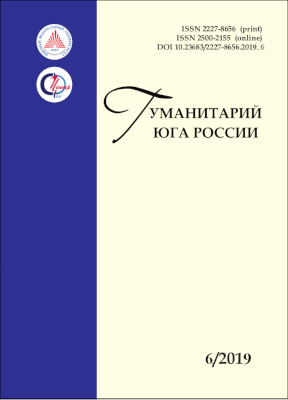Специфика и деловые стандарты общения в бизнес-коммуникации
Для цитирования
Анистратенко Т. Г. Специфика и деловые стандарты общения в бизнес-коммуникации // Гуманитарий Юга России. 2019. Том 8. № 6. С. 114-125. DOI: https://doi.org/10.23683/2227-8656.2019.6.7
Аннотация
В статье представлены специфика и текущие требования к деловому общению, частью которого является бизнес-коммуникация. Автор останавливается на особенностях бизнес-коммуникации с точки зрения делового дискурса и его специфики, делая акцент на сходстве и различии между коммуникацией как социальным актом и бизнес-коммуникацией как специфическим деловым общением в экономической сфере. Показаны факторы эффективной бизнес-коммуникации, а также наиболее распространенные ошибки при деловом речевом общении, языковая и дискурсивная специфика делового бизнес-стиля и многое другое.Статья имеет прагматическую направленность и представляет собой синтетический ответ на ряд вопросов, стоящих перед коммуникантами в экономической сфере, с полезными теоретическими выводами по применению делового этикета и стандартов делового общения.
Ключевые слова:
бизнес-коммуникация, деловой дискурс, специфика, бизнес-сфера, эффективная коммуникация, бизнес-этика, бизнес-этикет
Литература
Введенская Л.А., Павлова Л.Г. Деловая риторика. 6-е изд. М.: КНОРУС, 2012.
Введенская Л.А., Павлова Л.Г., Катаева Е.Ю. Русский язык и культура речи : учеб. пособие для вузов. Ростов н/Д.: Феникс, 2013.
Вердербер Р., Вердербер К. Психология общения. СПб.: Прайм-Еврознак, 2003.
Веселов П.В. Аксиомы делового письма. Культура делового общения и официальной переписки. М.: Маркетинг, 2006.
Геген П. Психология манипуляции и подчинения. СПб.: Питер, 2005.
Гнатюк О.Л. Основы теории коммуникации : учеб. пособие. 2-е изд. М.: ИНФРА-М, 2012.
Burkart R. Science communicationю. Transl. M. Zlatev. V. Turnovo: PIC, 2000.
Daneshka A. International cooperation in international business. Sofia: IR-from unss, 2016.
Durankev B. Communication policy. Sofia: Holding, 2011.
Eko U. Umberto Traktat po obshta semiotika. Sofia: Nauka i izkustvo, 1993.
Mengyono D. Key terms in discourse analysis. Sofia: SV. Ohridsky, 2000.
Mitseva S. Text. Type of text. Voice tag. Sofia: Holding, 2011.
Petev, T. Theories of mass communication. Sofia: SV. Ohridski, 2004. 197 p.
Salwen М., Stacks D. An Integrated Approach to Communication Theory and Research. Mahwah, New Jersey: Lawrence Erlbaum Associates, 1996.
Santou D., Chanel М. International business negotiations and ethics of business relations. Sofia: SoftPress, 2006. 108 p.
Traut D., Rivkin, S. Be different or die: survival in an era of deadly competition. Sofia: Horizons, 2002.
Videnov M. Introduction to sociolinguistics. Sofia: Delphi, 2000. 106 p.
Введенская Л.А., Павлова Л.Г., Катаева Е.Ю. Русский язык и культура речи : учеб. пособие для вузов. Ростов н/Д.: Феникс, 2013.
Вердербер Р., Вердербер К. Психология общения. СПб.: Прайм-Еврознак, 2003.
Веселов П.В. Аксиомы делового письма. Культура делового общения и официальной переписки. М.: Маркетинг, 2006.
Геген П. Психология манипуляции и подчинения. СПб.: Питер, 2005.
Гнатюк О.Л. Основы теории коммуникации : учеб. пособие. 2-е изд. М.: ИНФРА-М, 2012.
Burkart R. Science communicationю. Transl. M. Zlatev. V. Turnovo: PIC, 2000.
Daneshka A. International cooperation in international business. Sofia: IR-from unss, 2016.
Durankev B. Communication policy. Sofia: Holding, 2011.
Eko U. Umberto Traktat po obshta semiotika. Sofia: Nauka i izkustvo, 1993.
Mengyono D. Key terms in discourse analysis. Sofia: SV. Ohridsky, 2000.
Mitseva S. Text. Type of text. Voice tag. Sofia: Holding, 2011.
Petev, T. Theories of mass communication. Sofia: SV. Ohridski, 2004. 197 p.
Salwen М., Stacks D. An Integrated Approach to Communication Theory and Research. Mahwah, New Jersey: Lawrence Erlbaum Associates, 1996.
Santou D., Chanel М. International business negotiations and ethics of business relations. Sofia: SoftPress, 2006. 108 p.
Traut D., Rivkin, S. Be different or die: survival in an era of deadly competition. Sofia: Horizons, 2002.
Videnov M. Introduction to sociolinguistics. Sofia: Delphi, 2000. 106 p.
Форматы цитирования
Другие форматы цитирования:
APA
Анистратенко, Т. Г. (2019). Специфика и деловые стандарты общения в бизнес-коммуникации. Гуманитарий Юга России, 8(6), 114-125. https://doi.org/10.23683/2227-8656.2019.6.7
Раздел
КУЛЬТУРА И ГЛОБАЛИЗАЦИЯ






